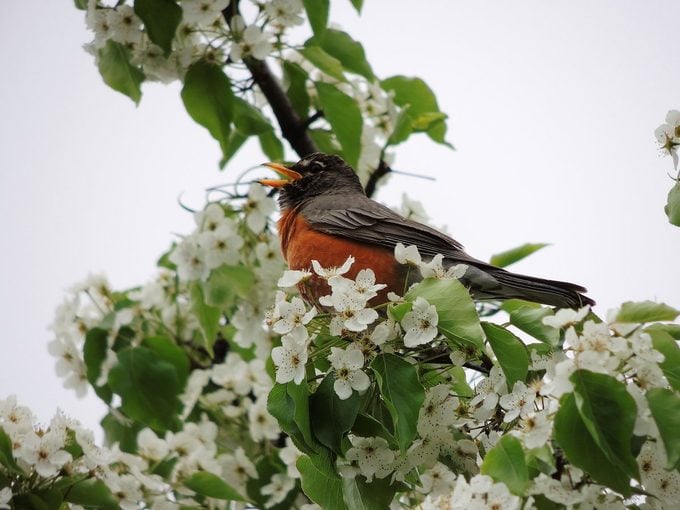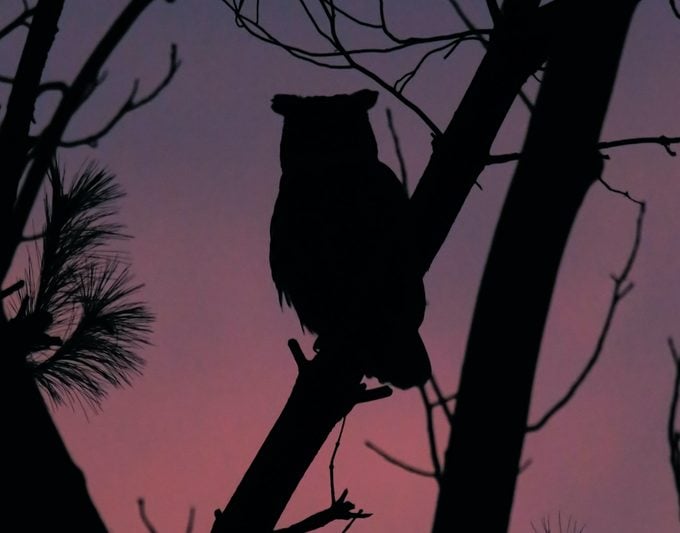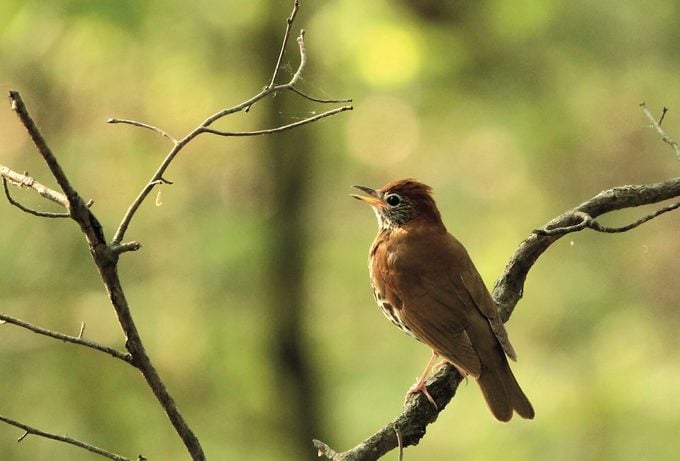Birds That Sing at Night: A Little Night Music
Updated: Jun. 26, 2024
We all hear birds that sing during the day, but what about birds that sing at night? Here's why some birds sing after sundown.
When you think of birdsong, you probably imagine a northern cardinal’s cheer-cheer-cheer or a black-capped chickadee’s fee-bee-bee. But what about the sounds you hear at night? While night-singing is less common, it does occur in the bird world.
On This Page
Why Do Birds Sing?

To understand birds that sing at night, first it’s important to understand why birds sing. Scientific research shows that birds sing for two main reasons, according to Jennifer Foote, a professor of biology at Algoma University whose research focuses on nocturnal birdsong. “For a bird that sings, the primary reason is to attract a mate and to defend a resource, like a territory,” she says. “Whether birds use the same song or different songs for that purpose will vary, but it’s pretty well established that those are the two main reasons that birds sing at any time of day.”
Check out fascinating facts about bird songs.
Evening Singers: The Dusk Chorus

Birds that sing in the evening are generally referred to as being part of the “dusk chorus.” As Jennifer explains, the dusk chorus begins after the sun sets and as daylight levels wane. “Not all species will sing regularly at dusk, but thrushes are among the species that would sing the most prolifically during the dusk chorus,” she says, also highlighting white-throated sparrows and a few species of warblers as commonly heard late in the day, depending on the season and one’s specific location. “But really, you get a big push from the robins, the hermit thrush and the veery at that time.”
These are the most musical songbirds in America.
Birds That Sing at Night

After the dusk chorus winds down, nighttime crooners take center stage. Who are the night singers? Lauryn Benedict, professor and associate director of the School of Biological Sciences at University of Northern Colorado, gives a simple answer. “Obviously, birds that are up at night will sing at night,” she says. Listeners might hear owls and other nocturnal fliers, such as eastern whip-poor-wills, common poorwills, nighthawks and common loons, when the moon is high.
In the case of owls specifically, Lauryn says hooting can be calling back and forth between mated pairs. It can also be “counter-singing,” a practice she describes as two birds fighting with each other through song.
“Sometimes you’ll hear two territorial owls, with one saying, ‘I’m here, this is my space, stay away’ and the other one responding, ‘I’m here, I hear you, this is mine,’ ” she says.
Listen for careful coordination to determine whether you’re hearing a duet or counter-singing. “If it’s counter-singing, it’ll be a song, and then you’ll wait a minute, and then somebody responds,” Lauryn says. “When you hear duets between mated pairs, they are precise and pretty close to each other. Either they overlap their songs with each other, or they alternate them really, really precisely.”
Learn how to identify birds by their song.
Diurnal Night Singers

While typically nocturnal birds such as owls sing at night, most backyard songbirds are diurnal, meaning they’re most active during the day. This means their singing occurs most frequently when the sun is up, and they’re less commonly heard after it sets. “There’s quite a lot of diurnal birds that will sing during the night sporadically,” Jennifer says, “but many of them don’t do it very frequently.”
One notable exception is the northern mockingbird, which has earned some notoriety within its range. “Mockingbirds are known for singing all night long, and we don’t necessarily know why,” Lauryn says. “Often when we hear them at night, we hear them in cities, and there are usually sources of light all night long in cities. It’s possible that they’re either fooled by or responding to artificial light that causes them to do that.”
Music in motion: meet the birds that sing while flying.
Early Birds: The Dawn Chorus

As the night sky brightens, daytime-singing birds begin warming up their vocal cords. Defined as the “dawn chorus,” the hour or so preceding sunrise often sees a wide variety of birds start to sing, resulting in a cheery chorus.
Where a bird fits in the dawn chorus can depend on its anatomy, according to Jennifer. “Different birds will start to sing at different periods of time, and it’s fairly predictable,” she says. “Research has shown that it’s the birds who have the largest eyes relative to their body size that start singing the earliest.”
Birds with the largest eyes can see in low light, so they’re spurred to begin typical daily activities even when it’s still dark outside. American robins and other thrushes are usually early soloists. Then come sparrows and chickadees, cardinals and corvids, and a variety of typical backyard birds. Warblers, such as the ovenbird, are usually among the last to chime in.
What to Do About Birds That Sing at Night

While many birders consider the dawn chorus majestic, some birds start crooning early enough to disturb humans’ sleep. If an avian musician is keeping you awake, try these tips.
Bird netting. For those looking to inspire birds to sing elsewhere, The Cornell Lab of Ornithology recommends covering a tree in bird-safe netting purchased from a garden center. Make sure to check the netting frequently.
Turn off spotlights. If you have bright lights on your home or in your yard, it’s possible your backyard birds are confusing these artificial light sources with sunlight. Consider turning down the brightness or even turning the lights off.
Wait it out. A singing bird can certainly be bothersome, but disturbances shouldn’t continue throughout the year. Most birds sing loudest and most frequently during spring, when they’re attempting to establish territories and attract mates. Once they’ve succeeded, your early bird alarm should stop ringing.
Next, learn what a Baltimore oriole song sounds like.
About The Experts
Lauryn Benedict is a professor and associate director at the University of Northern Colorado’s School of Biological Sciences. Her research focuses on bird song as a model of how communications evolve in nature, and she has studied the songs of warblers, parrots, wrens, and sparrows. She holds a doctorate degree in integrative biology from The University of California – Berkeley.
Jennifer Foote is the department chair of biology & environmental science at Algoma University. Her research focuses on nocturnal and dawn-singing birds, with a focus on ovenbirds and sparrows. She holds a doctorate from Queen’s University.


